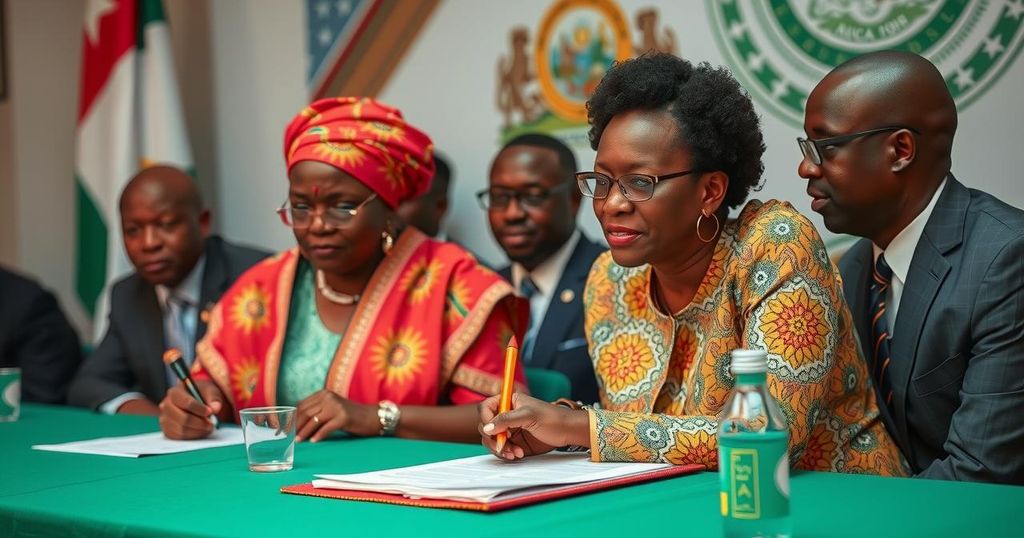The Ankara Declaration, facilitated by Türkiye, marks a crucial moment in the Horn of Africa, aiming to ease tensions between Ethiopia and Somalia. Expert Will Brown highlights Türkiye’s rising influence due to its trade and defense initiatives, as African nations are increasingly favoring direct engagement with Türkiye over European frameworks. The agreement emphasizes mutual respect and adherence to international law, indicating a new phase of cooperation in the region.
The Ankara Declaration, a significant agreement brokered by Türkiye between Ethiopia and Somalia, has been recognized as a transformative development for the Horn of Africa. This agreement is seen as a response to a year marked by escalating tensions in the region. Expert Will Brown from the European Council on Foreign Relations remarked on Türkiye’s rising influence, attributing it to the country’s successful trade and defense initiatives in Africa, which have positioned it as a critical player in the continent’s geopolitics.
Brown went on to articulate that many African nations prefer to engage directly with Türkiye rather than navigate the complexities of European diplomacy, which often consists of divergent agendas among its 27 member states. Although Europe remains Africa’s largest trading partner, its current focus has been diverted due to the ongoing Ukraine-Russia conflict. Brown noted that European officials often hold antiquated views of Africa, seeing it merely as a source of aid and migration rather than recognizing its potential and youthful dynamism.
Türkiye’s initiatives in the Horn of Africa, particularly its established trade relations and extensive involvement in Somalia, contribute to its prominence. The European Commission’s “Turkey Report” further underscores Türkiye’s positive role as a mediator in regional conflicts, highlighting its neutrality in the disputes in Somalia and Sudan. The tensions between Ethiopia and Somalia escalated after Ethiopia signed an agreement with Somaliland regarding the use of the Berbera port. To mitigate these hostilities, Türkiye facilitated discussions that culminated in the Ankara Declaration, attended by Somali President Hassan Sheikh Mohamud and Ethiopian Prime Minister Abiy Ahmed, where the leaders underscored their commitment to mutual sovereignty and integrity.
In light of these developments, Turkish President Recep Tayyip Erdogan stated, “We have taken the first step toward a new beginning based on peace and cooperation between Somalia and Ethiopia.” The overarching sentiment from the discussions was a pledge to respect international law and the principles outlined by the African Union, reinforcing the importance of diplomatic engagement in maintaining regional stability.
The Horn of Africa has been a region of significant geopolitical interest, particularly due to its complex inter-state relationships and historical conflicts. In recent years, tensions between Ethiopia and Somalia have escalated, particularly concerning territorial disputes and alliances with breakaway regions like Somaliland. This backdrop has made Türkiye’s diplomatic efforts particularly vital for fostering dialogue and security in the region. The Ankara Declaration serves as a potential pivot point, highlighting Türkiye’s role in regional diplomacy and its growing economic and military presence in Africa, notably through strategic partnerships and arms sales, including its Bayraktar drones. Furthermore, the traditional engagement of European nations with Africa has often been marred by outdated perceptions, emphasizing aid rather than fostering equal partnerships.
The Ankara Declaration represents a critical juncture in the political dynamics of the Horn of Africa, illustrating Türkiye’s expanding influence in a region historically dominated by European interests. Expert analyses reveal that African nations are increasingly looking toward Türkiye for partnership, highlighting a significant shift in geopolitical alliances. This agreement not only aims to pacify tensions between Ethiopia and Somalia but also reflects a broader narrative of African nations seeking autonomy and recognition on the international stage, moving beyond outdated perceptions of aid dependency.
Original Source: www.aa.com.tr







